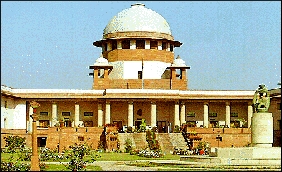|

|
SC nixes TRAI order on call drops
|
|

|
|
| Top Stories |
 |
|
|
|
SME Times News Bureau | 12 May, 2016
The Supreme Court on Wednesday struck down a Telecom Regulatory Authority of India (TRAI) notification obligating telecom service providers (TSPs) to compensate consumers for dropped calls.
Striking down the notification dated October 16, 2015, an apex court bench of Justice Kurian Joseph and Justice Rohinton Fali Nariman declared that "the impugned regulation is ultra vires of the TRAI Act and violative of the appellant's (Associations of TSPs) fundamental rights under Articles 14 and 19(1)(g) of the constitution".
The apex court also underlined that subordinate legislations should be framed after due consultation with all stakeholders so that they are transparent and shorn of any arbitrariness.
The TRAI had notified the Telecom Consumers Protection (Ninth Amendment) Regulations, 2015, by which every provider of mobile telephone services was made liable to credit only the calling consumer (and not the receiving consumer) with one rupee for each call drop, which takes place within its network, up to a maximum of three call drops per day.
Setting aside the February 29 Delhi High Court judgment in the case, the apex court said the high court was incorrect in holding that the penal regulation for call drops was for ensuing quality of service.
Pronouncing the judgment, Justice Nariman said: "(October 16 TRAI) Regulation does not lay down any quality of service -- what it does is to penalise service providers even though they conform to the 2 percent standard laid down by the Quality of Service Regulations, 2009."
"The finding that a transparent process was followed by TRAI in making the Impugned Regulation is only partly correct. While it is true that all stakeholders were consulted, but unfortunately nothing is disclosed as to why service providers were incorrect when they said that call drops were due to various reasons, some of which cannot be said to be because of the fault of the service provider," the judgment said.
Pointing that 2 percent ceiling on the call drops as a condition of licence and October 16 regulation penalising call drops should be seen together, the judgment said: "We also find that when the service provider argued that it was being penalised despite being within the tolerance limit of 2 percent, the answer given by the high court is disingenuous, to say the least, when the high court says that 2 percent is a quality parameter for the entire network as opposed to payment of compensation to an individual consumer. We are unable to appreciate the aforesaid reasoning."
"We find that, subject to certain well defined exceptions, it would be a healthy functioning of our democracy if all subordinate legislation were to be "transparent" and framed after consultation with all the stakeholders."
"We would exhort parliament to take up this issue and frame a legislation along the lines of the US Administrative Procedure Act (with certain well defined exceptions) by which all subordinate legislation is subject to a transparent process" involving consultation with all the stakeholders," the court said.
Similarly, it said the power of making rules and regulations is exercised after due consideration of the views of all stakeholders with an explanatory memorandum stating as to why the views of the stakeholders were agreed with or disagreed.
"Not only would such legislation reduce arbitrariness in subordinate legislation making, but also conduce to openness in governance. It would also ensure the redressal, partial or otherwise, of grievances of the stakeholders concerned prior to the making of subordinate legislation," the Supreme Court said.
This, the court said, would "obviate, in many cases, the need for persons to approach courts to strike down subordinate legislation on the ground of such legislation being manifestly arbitrary or unreasonable".
|
|
|
| |
|
|
|
|
|
|
|
|
|
|
|
|
|
|
| |
| Customs Exchange Rates |
| Currency |
Import |
Export |
US Dollar
|
66.20
|
64.50 |
UK Pound
|
87.50
|
84.65 |
Euro
|
78.25
|
75.65 |
| Japanese
Yen |
58.85 |
56.85 |
| As on 13 Aug, 2022 |
|
|
| Daily Poll |
 |
 |
| PM Modi's recent US visit to redefine India-US bilateral relations |
|
|
|
|
|
| Commented Stories |
 |
|
|
|
|
|
| |
|